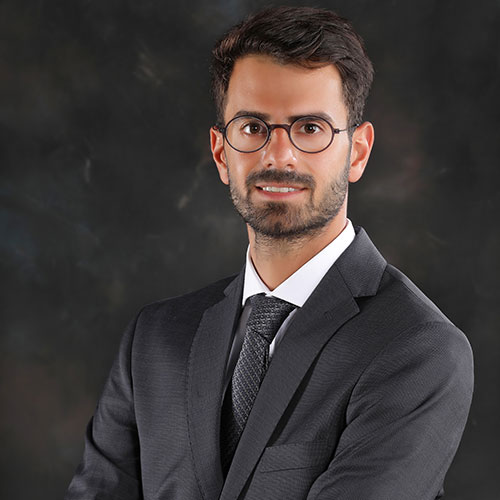Carl Helou
Strategy& alumnus Carl Helou is the co-founder of Kammoon and a current Investment Banking Associate at Credit Suisse. During a recent interview, Carl reflected on his time at Strategy&, his experience founding and turning around a cloud kitchen start-up, and his plans for the future.
When did you first join the Strategy& team?
I joined Strategy& in 2015 after completing a four-month internship during the summer of 2014. It was my first job and I was very excited to come back to the Middle East after finishing my bachelor’s degree in engineering at McGill University.
What was your area of focus within the business?
My work experience at Strategy& was eclectic and enriching. Over a three-year tenure, I worked on 14 engagement projects spanning various industries including logistics, transport, real estate, tourism and telecommunications.
What did you gain from your time at Strategy&?
Professionally, I gained a lot of maturity and learned a variety of soft and hard skills. From prioritizing work and building relationships, to communicating clearly and aligning expectations with my teammates, these skills will serve me for the rest of my career.
Equally as important, I also took away camaraderie and a strong network from my time at Strategy&. I vividly remember the long nights crunching Excel models, the silly jokes, and the team dinners and outings. I also remember the excitement of working in new geographies with different set-ups.

Cofounder and CEO, Kammoun;
Investment Banking Associate, Credit Suisse
Former office: Beirut
Alumnus since 2018
What was your first endeavor after moving on from Strategy&?
I really enjoyed being an advisor, however, my entrepreneurial spirit led me to become the CEO of Kammoon. Kammoon is a cloud kitchen that I co-founded in 2016. From a small kitchen delivering home-cooked Lebanese meals, Kammoon grew to become one of the leading cloud kitchens, bringing delicious Lebanese food to the forefront of the market.
Currently Kammoon offers its services to individual consumers and businesses alike. It has a leading position on both delivery and catering platforms, plus it has also recently ventured into the distribution business, bringing its products to the shelves of top UK retailers including Whole Foods and Planet Organic.
Tell us more about cloud kitchens—what are they?
With the adoption of online food delivery platforms and the exponential increase of online ordering, the food delivery landscape has seen the rise of what’s called “cloud kitchens” – which are also known as “dark” or “ghost” kitchens. Cloud kitchens are delivery-only restaurants, with no dine-in facilities, that are designed for speed, quality and scale. Unlike traditional restaurants which necessitate high capital expenditure, high staff costs due to table service and usually a high-traffic location, a cloud kitchen is a great alternative option to launch a delivery restaurant with low risk and low capital. Cloud kitchens also have the potential to serve multiple cuisines under different brands from the same kitchen.
Cloud kitchens are particularly popular in big cities that are characterized by high population density and staggering rents. In fact, most cloud kitchens operate from underutilized commercial real estate assets such as basements, cubicles deployed in parking lots and even first floors of licensed commercial buildings.
“I took away camaraderie and a strong network from my time at Strategy&. I also remember the excitement of working in new geographies with different set-ups.”
How do you foresee the food delivery landscape evolving?
For cloud kitchen businesses, operational excellence is the name of the game. Cloud kitchens are reducing the complexity of their operations by adapting to small and specialized menus focused on top selling dishes. Equally as important, the integration of technology in kitchens has become essential for success. Leading businesses are integrating robots and partially automating their food production lines. The optimization of kitchen operations coupled with the adoption of the latest PoS systems has enabled ghost kitchens to churn orders in as little as five minutes and drastically drop their labor costs.
The pandemic has also accelerated the use of digital channels and I expect online delivery penetration to continue gaining ground. The new emerging food delivery landscape is substantially different. While traditional restaurants previously operated across the whole value chain, the rise of delivery platforms has disrupted the status-quo and forced restaurants to revise their operating models. The value chain is now more segregated and specialized amongst various players, forcing restaurants and cloud kitchens to become solely focused on food production.
Simultaneously, third party delivery platforms are merging forces to build a critical mass of users and leverage ample user data, while enhancing their unit economics and ultimately their profitability. In fact, consolidation has already started to occur and is likely to continue in most markets. In the next phase of growth, I expect third party delivery platforms to shift laterally on the value chain and venture into the food production business.
Lastly, when it comes to consumer preferences, the trends are shifting toward health, sustainability and value for money. Vegan and vegetarian concepts are gaining in popularity. In 2019, nearly one in four new food-product launches in the United Kingdom were for a vegan product.
What are you up to now?
After turning around Kammoon, I decided to pursue an MBA at London Business School with the aim of exploring the finance industry in London. During my MBA, I have managed to travel and kitesurf in eight different countries. I am also working towards becoming a certified paraglider. Apart from that, I tend to keep it simple during my free time. I enjoy traveling, working out, spending time with friends and family, and watching a good documentary.
What comes next after you complete your MBA?
Post MBA, I will be joining Credit Suisse in their financial sponsor’s practice. My goal is to deepen my financial skillset and work on large M&A transactions. Ultimately, my long-term career objective consists of taking a managerial position encompassing strategy, finance and operations.
“The integration of technology in kitchens has become essential for success.”



